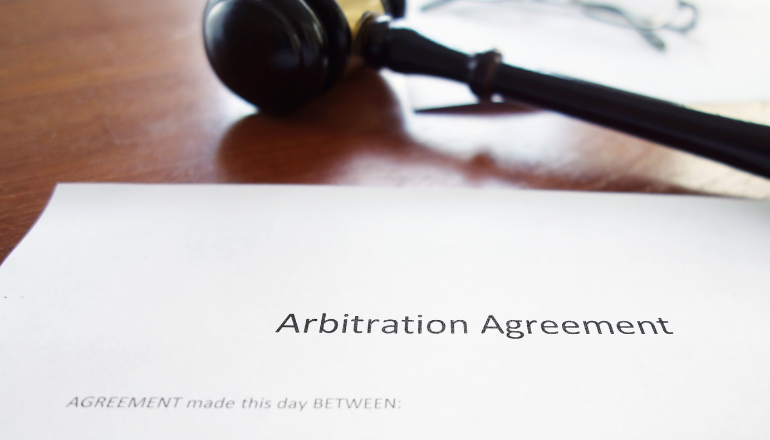
Background
The Supreme Court has, in Patel Engineering Limited v. North Eastern Electric Power Corporation Limited,[1] reaffirmed the scope of patent illegality, post the 2015 amendment of the Arbitration and Conciliation Act, 1996 (“Act”), as a ground to challenge a domestic award under Section 34 of the Act.
Disputes between Patel Engineering Limited (“Patel Engineering”) and North Eastern Electric Power Corporation Limited (“NEEPCL”), arising out of works contracts for three separate packages, culminated in three arbitral awards dated March 29, 2016. One of the issues in each of the three arbitral proceedings was which clause of the conditions of contract would apply to decide the rate at which Patel Engineering was entitled to extra payment for additional quantities of lead. The arbitrator’s interpretation was in favour of Patel Engineering in all three awards. NEEPCL challenged the awards before the Additional Deputy Commissioner (Judicial), Shillong, who upheld the awards.
In an appeal under Section 37 of the Act, the Meghalaya High Court set aside the order of the Additional Deputy Commissioner (Judicial), Shillong. Patel Engineering filed Special Leave Petitions before the Supreme Court, which were dismissed without reasons. Patel Engineering then filed review petitions before the Meghalaya High Court on the ground that the judgement of the High Court suffers from errors apparent on the face of the record insofar as it did not take into consideration the amendments made to the Act in 2015 by the Arbitration and Conciliation (Amendment) Act, 2015 (“Amendment Act”). The High Court dismissed the review petitions, which led to the present challenge before the Supreme Court.
Patel Engineering contended that the High Court erred in applying the provisions of the Act as applicable prior to its amendment in 2015 and that the judgement of the High Court suffers from an error apparent on the face of the record since the High Court relied upon Oil & Natural Gas Corporation Ltd. v. Saw Pipes Ltd.[2]and Oil & Natural Gas Corporation Ltd. v. Western Geco International Ltd.[3], which ceased to be good law after the amendment of the Act in 2015.
Decision
The Supreme Court relied on its decision in Board of Control for Cricket in India v. Kochi Cricket Private Limited[4] and found that the Act as amended in 2015 would apply to the present case, as the awards were passed, and the applications challenging the awards were filed, after the commencement of the Amendment Act.
The sub-heads of patent illegality, as laid down in Associate Builders v. Delhi Development Authority[5] and Ssangyong Engineering and Construction Company Limited v. National Highways Authority of India,[6] were reaffirmed. The Court ultimately dismissed the petitions filed by Patel Engineering while holding as follows:
- Patent illegality, as a ground for setting aside an award, has been given statutory force in Section 34(2A) of the Act, as amended. This ground cannot be invoked in international commercial arbitrations seated in India or for resisting enforcement of a foreign award under Section 48 of the Act.
- The present case arises out of a domestic award between two Indian entities. Patent illegality is available as a ground for setting aside a domestic award if:
- the decision of the arbitrator is found to be perverse or so irrational that no reasonable person would have arrived at the same;
- the construction of the contract is such that no fair or reasonable person would take; or
- the view of the arbitrator is not even a possible view.
- The High Court arrived at the correct conclusion that an arbitral award can be set aside under Section 34 of the Act if it is patently illegal or perverse, in conformity with the decisions of the Supreme Court in Associate Builders (supra) and Ssangyong (supra).
- The High Court held that no reasonable person could have arrived at a different conclusion while interpreting the relevant clauses of the contract and that any other interpretation would be irrational and in defiance of all logic. The High Court also found that the arbitrator arrived at his findings by taking irrelevant factors into account and by ignoring vital clauses of the contract and therefore these findings suffer from the vice of irrationality and perversity.
- Even though the High Court referred to various judgements, including Western Geco (supra), which are no longer good law, the case has been decided on the ground that the arbitral award is perverse and the view taken by the arbitrator is not even a possible view, on a holistic reading of all the terms and conditions of the contract. The High Court has rightly followed the test set out in Associate Builders (supra), which was reiterated in Ssangyong (supra).
- The High Court rightly dismissed the review petitions filed by Patel Engineering, and there is no ground warranting interference with the impugned order.
Comment
The central issue in the present proceeding was whether the High Court rightly dismissed the review petition filed by Patel Engineering. The review was filed mainly on the ground that the High Court erroneously applied the provisions as applicable prior to the Amendment Act, by inter alia relying upon the decisions in Saw Pipes (supra) and Western Geco (supra). The Supreme Court refused to take a narrow view and essentially rejected the contention that the High Court’s judgement was erroneous merely because it relied on Saw Pipes (supra) and Western Geco (supra), given that the test applied by the High Court was in line with Associate Builders (supra) and Ssangyong (supra). In answering this issue, the Supreme Court had occasion to further delineate the contours of “patent illegality” under Section 34 of the Act.
The Court traced the genesis of the ground of patent illegality to Saw Pipes (supra), where the Court was dealing with a domestic award and expanded the interpretation of “public policy of India” in Section 34(2)(b)(ii) of Part I of the Act to include patent illegality. In its judgment in Associate Builders (supra), the Supreme Court, on the basis of the unamended Section 34 of the Act and the existing judicial dicta on the subject, formulated three exhaustive sub-heads of patent illegality, as a ground for challenge to an arbitral award, namely –
- A contravention of the substantive law of India would result in the death knell of an arbitral award. This must be understood in the sense that such illegality must go to the root of the matter and cannot be of a trivial nature;
- A contravention of the Arbitration Act itself would be regarded as a patent illegality. For example, if an arbitrator gives no reasons for an award, in contravention of Section 31(3) of the Act, such award will be liable to be set aside;
- An arbitral tribunal must decide in accordance with the terms of the contract, but if an arbitrator construes a term of the contract in a reasonable manner, it will not mean that the award can be set aside on this ground. Construction of the terms of a contract is primarily for an arbitrator to decide unless the arbitrator construes the contract in such a way that it could be said to be something that no fair-minded or reasonable person would do.
The Act was amended in 2015 by the Amendment Act. The amended provisions came into force from October 23, 2015, and the ground of “patent illegality” for setting aside a domestic award was given statutory force in Section 34(2A) of Act. Importantly, the said section also provided that an award shall not be set aside merely on the ground of an erroneous application of the law or by reappreciation of evidence. This was followed by the judgement of the Supreme Court in Ssangyong (supra), wherein the Court excluded point (i) above and reiterated points (ii) and (iii) from Associate Builders (supra) as forming part of the new statutory character of patent illegality (a ground now not available to challenge an award arising out of an international commercial arbitration). While reiterating point (iii), the Court held that in short, under this sub-head, the arbitrator’s view should not even be a possible view to take. The Court also noted that if the arbitrator wanders outside the contract and deals with matters not allotted to him, he commits an error of jurisdiction.
In the present case, the Court has, after affirming the Ssangyong (supra) view of patent illegality, further supplemented/explained point (iii) above, by holding that if the decision of the arbitrator is found to be perverse, or, so irrational that no reasonable person would have arrived at the same; or, the construction of the contract is such that no fair or reasonable person would take; or, the view of the arbitrator is not even a possible view; then the award is required to be set aside as being patently illegal. This sub-head of patent illegality, available for setting aside a domestic award [which is to be read together with point (iii) above], would be in addition to the other sub-head, highlighted above in point (ii).
[1] Order dated 22nd May 2020 in Special Leave Petition (C) Nos. 3584-85 of 2020
[2] (2003) 5 SCC 705
[3] (2014) 9 SCC 263
[4] (2018) 6 SCC 287. For an analysis of this judgement, please see http://corporate.cyrilamarchandblogs.com/2018/05/bcci-v-kochi-cricket-supreme-courts-much-needed-third-umpire-decision/
[5] (2015) 3 SCC 49
[6] (2019) 15 SCC 131



